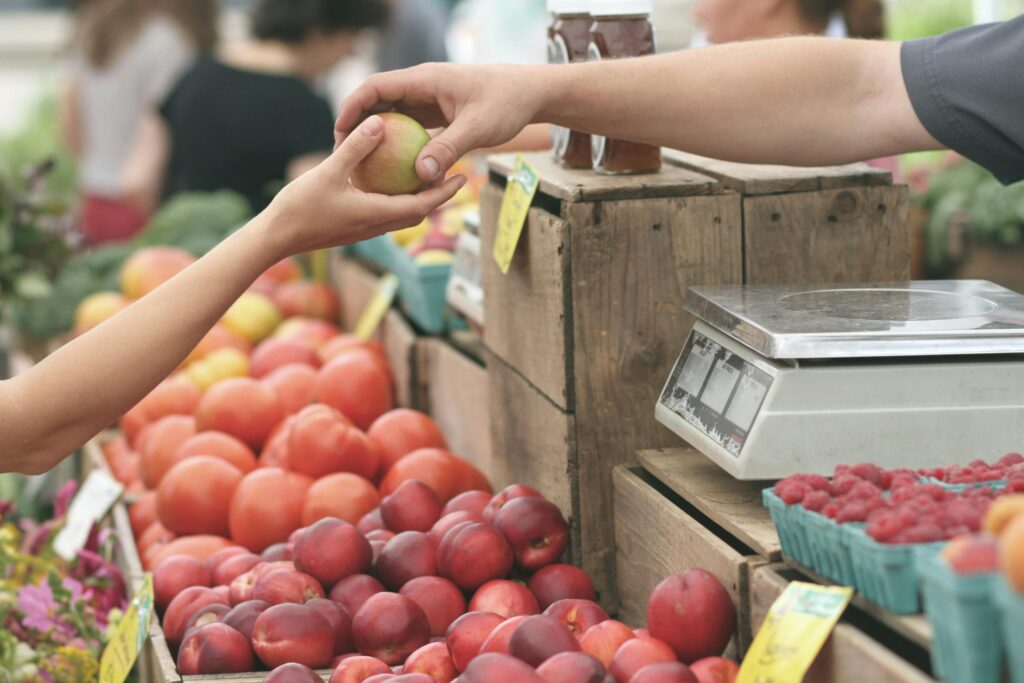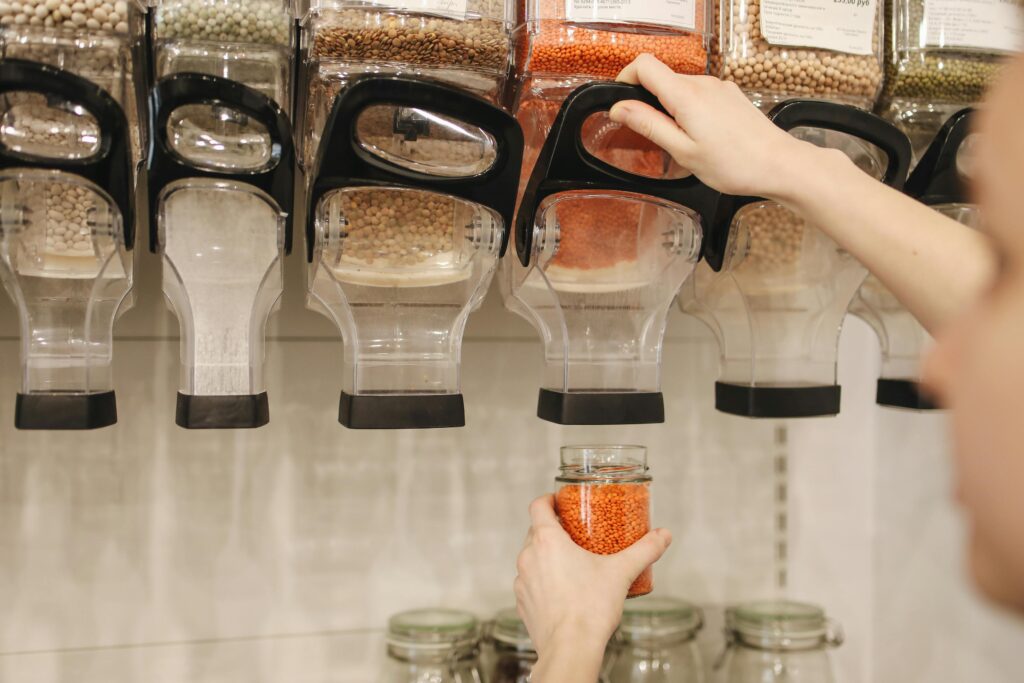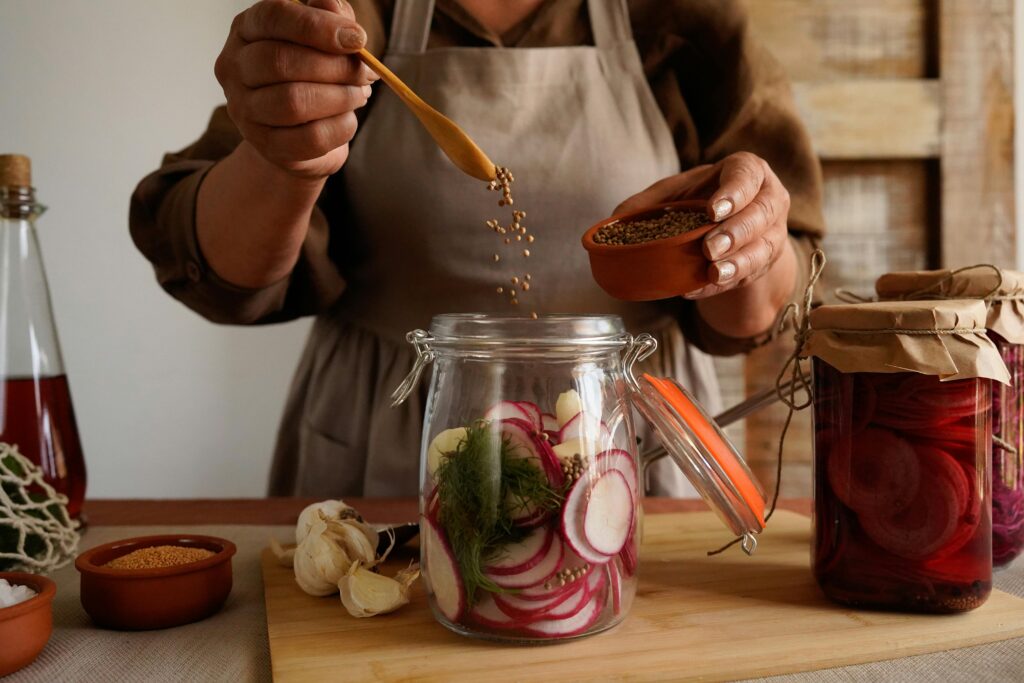If you’ve ever unpacked your groceries and felt overwhelmed by all the plastic packaging — you’re not alone. From produce wrapped in cling film to snack packs and bottled sauces, the average grocery trip creates an alarming amount of single-use waste. But the good news? You can shop smarter and lighter — and it’s way easier than it looks.
Zero waste grocery shopping isn’t about perfection. It’s about progress — reducing plastic step by step and finding better, reusable alternatives that fit your lifestyle. Whether you’re a seasoned eco-warrior or just getting started, this guide will walk you through how to grocery shop plastic-free and store your food sustainably once you get home.
Why Grocery Shopping Creates So Much Waste
Let’s start with the problem. Grocery stores are designed for convenience — everything pre-packaged, sealed, and ready to grab. Unfortunately, that convenience often comes wrapped in single-use plastic. Here’s where most of the waste sneaks in:
- Produce packaging: Pre-bagged greens, plastic clamshells for berries, and shrink-wrapped cucumbers.
- Dry goods: Pasta, rice, snacks, and cereal in multi-layered plastic bags.
- Beverages: Plastic bottles and aluminum cans that rarely get recycled properly.
- Meat and dairy: Styrofoam trays, plastic wrap, and sealed pouches.
The average household throws away hundreds of pounds of packaging every year — and most of it can’t be recycled. The result? Landfills, ocean pollution, and microplastics entering our food chain.
But with a little preparation, you can dramatically cut this down. The key is to plan ahead, bring your own containers, and choose package-free options whenever possible.
How to Prepare for a Zero Waste Grocery Trip
Before you hit the store, a few minutes of prep can make all the difference. Here’s how to get ready like a pro zero-waster:
1. Make a Realistic Shopping List
Plan your meals for the week and make a list based on what you actually need. Shopping with intention helps you buy just the right amount and prevents food waste (which is another big environmental issue).
2. Gather Your Reusables
Think of it like packing your grocery “toolkit.” Depending on what you buy, you might need:
- 🛍️ Reusable shopping bags (canvas or jute)
- 🥦 Mesh produce bags for fruits and veggies
- 🍚 Glass jars or stainless steel containers for bulk items
- 🍞 Cloth bags for bread and baked goods
- 🥤 Reusable bottles or coffee cups (for drinks or refills)
Pro tip: Keep a “zero waste kit” in your car or near the door so you don’t forget these on your next trip.
3. Find a Bulk or Package-Free Store
Check if there’s a local store that sells bulk food — grains, nuts, spices, cleaning supplies, etc. Many health food stores, co-ops, and farmers’ markets offer bulk bins or allow customers to bring their own containers. If not, you can still find unpackaged produce and paper-wrapped bakery items at most supermarkets.
At the Store: Shopping the Zero Waste Way
Now comes the fun part — actually shopping! Here’s how to make the most of your grocery run while keeping it plastic-free.
1. Buy Loose Produce
Skip the pre-packaged fruits and veggies. Opt for loose items you can place in your own produce bags. Not only do you avoid plastic, but you also get to choose exactly how much you need — which reduces waste and saves money.
2. Shop the Bulk Bins
This is the holy grail of zero waste grocery shopping. You can bring your own jars or cloth bags, weigh them (to get the “tare weight”), and fill them with dry goods like rice, lentils, oats, spices, and even snacks.
Tip: If your store requires it, weigh your empty containers before filling and write the tare on the jar with a marker or sticker.
3. Choose Glass, Metal, or Paper Packaging
If you can’t find an unpackaged version, go for recyclable materials like glass jars or aluminum cans instead of plastic. Glass jars can be reused endlessly — great for food storage, DIY candles, or even planters.
4. Visit Local Markets
Farmers’ markets are amazing for zero waste shopping. You can often bring your own bags, buy fresh seasonal produce, and even chat with vendors about packaging-free options. Plus, you’re supporting local farmers and cutting down on transport emissions.
5. Skip Single-Use Snacks and Drinks
It’s tempting to grab chips or bottled smoothies, but they’re packaging-heavy. Try making your own snacks — roasted chickpeas, granola bars, or trail mix in reusable containers. You’ll save money and waste less.
Plastic-Free Food Storage at Home
Okay, you made it home with your eco-friendly haul — now what? Let’s talk about how to store your food without resorting to plastic wrap or zip bags.
1. Use Glass Jars for Pantry Staples
Old mason jars, pasta sauce jars, or even candle jars can be cleaned and reused to store grains, nuts, and spices. They keep food fresh and let you easily see what you have. Plus, your pantry will look aesthetic (Pinterest-worthy, even).
2. Store Produce the Smart Way
Each fruit and veggie has its own storage preference. Here are a few quick hacks:
- 🥕 Carrots and celery stay crisp in water-filled jars.
- 🥬 Leafy greens last longer when wrapped in a damp cloth inside the fridge.
- 🍋 Citrus and apples prefer cool, dry spots — no need for plastic bags.
- 🍌 Keep bananas separate from other fruits to slow ripening.
3. Replace Plastic Wrap with Beeswax Wraps or Silicone Lids
Beeswax wraps are reusable, washable, and biodegradable — perfect for covering bowls or wrapping sandwiches. For leftovers, use silicone stretch lids or simply place a plate over the bowl. Easy and no waste.
4. Freeze Food in Reusable Containers
Glass containers with silicone lids are freezer-safe and won’t crack under cold temperatures. You can also reuse old jars — just leave a little space at the top for expansion. Avoid freezing in single-use plastic bags; silicone freezer bags are a great alternative.
5. Buy (or Make) Reusable Snack Bags
Reusable snack bags made of silicone or cloth are perfect for school lunches, snacks, or meal prep. Wash and reuse them hundreds of times — no more disposable sandwich bags.
Tips for Bulk Shopping Success
Shopping in bulk can feel intimidating at first, but once you get the hang of it, it’s honestly kind of fun — and super satisfying. Here are a few tips to make it smoother:
- Label your jars or bags before leaving home — it saves time at checkout.
- Keep containers lightweight to make carrying easier. Cloth bags or small jars are great for this.
- Buy only what you’ll use — bulk doesn’t mean hoarding! It’s about getting the exact amount you need.
- Check for local refills of dish soap, detergent, and oils — it’s not just food that can go package-free.
- Support stores that support the planet. Many bulk stores reinvest in community or environmental projects.
Once you start bulk shopping, you’ll notice two things: your trash bin gets emptier, and your pantry gets prettier. Win-win.
Making It Work in the Real World
Let’s be real — sometimes zero waste grocery shopping feels like an uphill battle. Maybe your local store doesn’t offer bulk bins, or you forget your jars at home (it happens to the best of us!). The goal isn’t perfection; it’s consistency.
Even if all you do is bring your own bags and buy loose produce, you’re already making a difference. And the best part? Every time you shop with reusable containers, you’re sending a tiny message to retailers that people want sustainable options.
Start Small, Stay Consistent
Here’s a simple action plan:
- Start with produce — skip plastic bags.
- Add jars and cloth bags next time for bulk goods.
- Refill instead of rebuying when possible.
- Invest in durable storage — glass, silicone, or stainless steel.
Each trip builds momentum. And over time, it becomes second nature.
Zero Waste Grocery Myths — Busted
“Zero waste is expensive.”
Not true! While reusable items may cost more upfront, they save you money over time. Buying in bulk and avoiding pre-packaged goods often means you pay less per ounce — and waste less food.
“I need special containers.”
Nope. You can reuse jars from pickles, pasta sauce, or coffee. As long as it’s clean and has a lid, it works.
“It’s too much work.”
It might take a little practice, but once you find your rhythm, it’s actually simpler — fewer trips to take out the trash, fewer plastic bags cluttering your home, and more intentional shopping.
Closing Thoughts
Zero waste grocery shopping is not about being perfect — it’s about being mindful. Every reusable bag, every jar refill, and every plastic-free swap adds up to something bigger. You’ll not only reduce your personal waste but also inspire others to think differently about consumption.
Next time you head to the store, grab your bags, jars, and confidence. Shop with intention, store with care, and celebrate every step you take toward a cleaner, greener lifestyle 🌎💚.
Live light. Live right. — The EcoHabitKit Team



